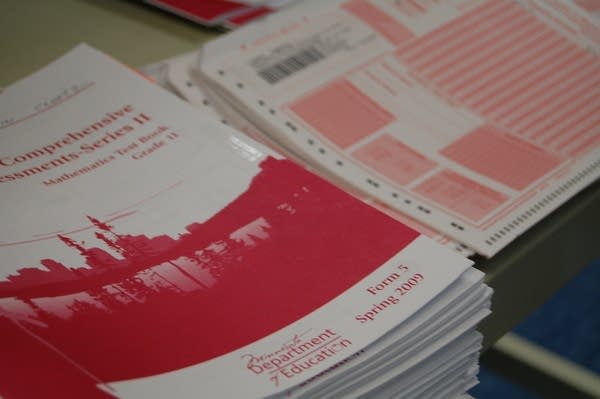With new GRAD test done, passing score can now be set
Go Deeper.
Create an account or log in to save stories.
Like this?
Thanks for liking this story! We have added it to a list of your favorite stories.

Tate Rusk, 17, hopes a good senior year football season this fall at Brainerd High might help him find a team to join in college - maybe North Dakota State or Bemidji State.
But first things first: He has to pass that math test.
"One of my struggles is for sure my math," Rusk said. "I've had problems with that since, I don't know, 7th or 8th grade. It puts a lot of pressure on kids' shoulders."

Rusk was one of thousands of high school juniors who took the MCA-II math test this spring. That test also contained the GRAD test which - for the most part - everyone must pass to get a diploma.
Turn Up Your Support
MPR News helps you turn down the noise and build shared understanding. Turn up your support for this public resource and keep trusted journalism accessible to all.
Tate's mother, Andrea Rusk, is also anxious.
"His comment last night was 'it was really hard,'" she said. "And he struggles with probability, so he was talking about the probability problems."
By the way, Andrea the mom is also Andrea the principal of Brainerd High School. And she's nervous, regardless of which hat she's wearing.
"When you work so closely with these kids - some have worked very hard for 12 years and to have it not be realized is tough," she said.
Now that the MCA's are over, schools have been sending back all those booklets and answer forms for grading. But the passing score for that 11th-grade GRAD test isn't known yet.
That might seem weird - especially for those of us who remember knowing before a class or test that 90 percent would be an A, 80 percent a B and so on. But the state says that's not really a fair way to gauge proficiency.

When you think about it, who came up with 90/80/70 in the first place?
Education Commissioner Alice Seagren said setting that passing - or 'cut' score - has to come after.
"If you do it before you have that test impact data, you're really like taking a dart and aiming for a bullseye," she said. "It's much more appropriate to wait for the students to take the test."
So what Minnesota and at least two dozen other states do is called 'standard setting.' They establish the grade at which a student is considered proficient, it could be 87 or 57. They find that magic number by first reviewing every test question to see how well students did on each.
That's key, according to John Willsee, because it lets everyone know how hard the test was. Willsee teaches educational research at the University of North Carolina - Greensboro.
"What they want to do is ensure they don't use these rough rules people grew up with, like 90 percent means passing, because that's actually a completely arbitrary standard," he said. "They take all this information into consideration in setting an appropriate cut score that will be fair to test takers."
The process includes a number of rounds where groups of teachers and other professionals look at a host of data to find a fair score. It's not a curve, Willsee said. It's a process of finding a fair score based on the test's difficulty.
"People are always concerned that there's some sort of gamesmanship going on with how these standards are set," he added. "The people working on these are trying to get the best possible cut score that represents the intent of the test.
"And it requires bringing lots of different expertise to the table. And that's why these things can take a little while and why they go through several levels - because they want to check their work and make sure it's defenseable."
That means Tate Rusk and his fellow soon-to-be-seniors won't know their scores until June. Brainerd High Schoolers who don't pass will enter a class next year that prepares them for a re-take.
Rusk, though, said he thinks he did pretty well.
"It wasn't as bad as kids thought it would be. During the test there'd be some [questions], 'wow, this is really on here - we learned this in 5th, 6th grade.' But then you get to some where 'how do you even start this problem?'"
Tate even goes as far as asserting that he probably passed, even though at this point the state doesn't know if he did.
Dear reader,
Political debates with family or friends can get heated. But what if there was a way to handle them better?
You can learn how to have civil political conversations with our new e-book!
Download our free e-book, Talking Sense: Have Hard Political Conversations, Better, and learn how to talk without the tension.




